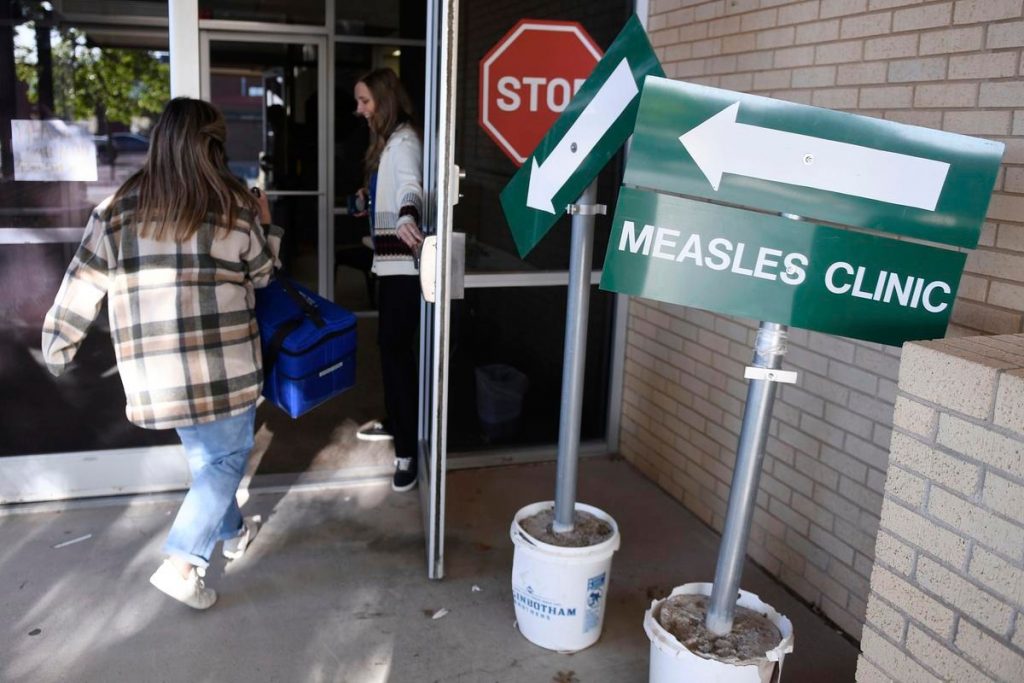Wisconsin No Longer a Leader in Childhood Vaccinations
Percentage of children not getting vaccinated 4 times higher than 25 years ago.

Health department staff members enter the Andrews County Health Department measles clinic carrying doses of the measles, mumps and rubella vaccine April 8, 2025, in Andrews, Texas. (Annie Rice / Associated Press)
The percentage of Wisconsin schoolchildren not receiving state-mandated vaccinations because of their parents’ personal beliefs is four times higher than it was a generation ago.
That rise in personal conviction waivers has driven a decrease in all immunizations among Wisconsin children ahead of new measles outbreaks hitting the U.S. that are linked to three deaths.
Wisconsin’s measles vaccination rate among kindergartners was the third-lowest in the nation in the 2023-24 school year, behind Idaho and Alaska. (Montana didn’t report data.)
Here’s a look at how we got here.
Vaccine laws in all 50 states
Immunizations are so common that all 50 states have laws requiring them for schoolchildren. Wisconsin was among the first, in 1882.
In the 1950s, the child mortality rate was 4.35%, largely due to childhood diseases. That rate dropped to 0.77% by 2022, according to the nonpartisan Wisconsin Legislative Fiscal Bureau.
“Vaccines have brought about one of the largest improvements in public health in human history, making diseases that once caused widespread illness and many deaths, such as measles, mumps, and rubella, rare in the United States,” the agency reported.
For the 2024-25 school year, Wisconsin required seven immunizations (18 doses) for children to enter school. That included shots for measles (MMR), polio and hepatitis B. COVID-19 and influenza vaccines are not included.
Overall, the vast majority of Wisconsin students, 89.2%, met the minimum immunization requirements in the 2023–24 school year, according to the state’s latest annual report.
That’s essentially unchanged from the previous two school years.
But it’s down more than three percentage points from 92.3% in 2017-18.
For highly communicable diseases such as measles, a threshold above 95% is needed to protect most people through “herd immunity.”
More parents refusing to get kids vaccinated
Wisconsin had been a national leader in childhood immunizations.
But increasingly, Wisconsin parents are opting out:
- For all childhood immunizations, vaccination rates statewide were lower in almost every quarter from 2020 through 2024, in comparison with the average rate in the three years before COVID-19.
- Wisconsin was one of the states with the largest drops in the measles vaccination rate for kindergartners between the 2022-23 and 2023-24 school years, and no county had an MMR vaccination rate above 85%, The Economist reported.
- By a different measure, the measles vaccination rate for 2-year-olds in 2024 was as low as 44% in Vernon County and under 70% in 14 other counties.
On exemptions, Wisconsin differs from most states
All states have exemptions that allow parents not to have their children vaccinated. Medical and religious reasons are the most common.
In Wisconsin, there’s also a third waiver.
Wisconsin regulations say the Wisconsin Department of Health Services shall provide a waiver for health reasons if a physician certifies that an immunization “is or may be harmful to the health of a student”; or, if the parent of a minor student, or an adult student, submits a signed statement that “declares an objection to immunization on religious or personal conviction grounds.”
That philosophical exemption, based on personal beliefs, exists only in 15 states, including Wisconsin, Michigan and Minnesota.
“The bottom line is: If you don’t want your child vaccinated, you don’t have to,” said Kia Kjensrud, interim director of Immunize Wisconsin, which supports vaccination organizations.
In 2023-24, 6.1% of Wisconsin students used a waiver.
That includes 5.2% who had a personal conviction waiver — a rate more than four times higher than the 1.2% in 1997-98.
Waiver use has increased because the number of required vaccines and the legal protections given to vaccine manufacturers have “fueled skepticism about vaccine safety and testing rigor,” Wisconsin United for Freedom said in an email. The De Pere-based group works to protect “rights to medical freedom” and promotes vaccine skepticism.
Rep. Lisa Subeck, D-Madison, one of the lawmakers who introduced legislation in 2023 to repeal the personal conviction waiver, said she believes some parents have genuine convictions against vaccinations. But “many of the folks who are choosing this exemption are doing it because of misinformation” claiming that vaccines are dangerous, she said.
Groups that registered to lobby in favor of Subeck’s bill included associations of physicians, nurses and local health departments. Wisconsin Family Action, which works to advance Judeo-Christian values, opposed it. The bill did not pass.
Kjensrud also blamed Wisconsin’s declining immunization rates on misinformation. But she said that rather than legislation, her group wants to improve “messaging the safety, efficacy and lifesaving importance of vaccines, and increasing vaccination rates however we can.”
Bipartisan support for personal exemption
Wisconsin’s modern student immunization law was passed in 1975 with only the medical and religious waivers. In 1980, the Legislature added the personal conviction waiver.
The waiver was included in a broader amendment proposed by 10 Democratic members and 11 Republican members of the Assembly.
The lead sponsor was the late Richard Flintrop, who represented Oshkosh and was known as a child welfare advocate. He also was a former staff member to maverick Democratic U.S. Sen. William Proxmire.
Wisconsin United For Freedom said the recent measles outbreaks “raise valid concerns,” but that “the focus should be on balanced public health strategies that prioritize sanitation, nutrition, and informed choice alongside vaccination, rather than relying solely on mandates.”
Wisconsin Watch wants to hear your perspective on vaccinations. Do you have questions about measles, its vaccine or how to keep your family safe? Or do you have perspectives to share about prevention efforts in your community?
If so, fill out this brief form. Your submissions will shape the direction of our reporting and will not be shared publicly.
This article first appeared on Wisconsin Watch and is republished here under a Creative Commons Attribution-NoDerivatives 4.0 International License.![]()
If you think stories like this are important, become a member of Urban Milwaukee and help support real, independent journalism. Plus you get some cool added benefits.




















